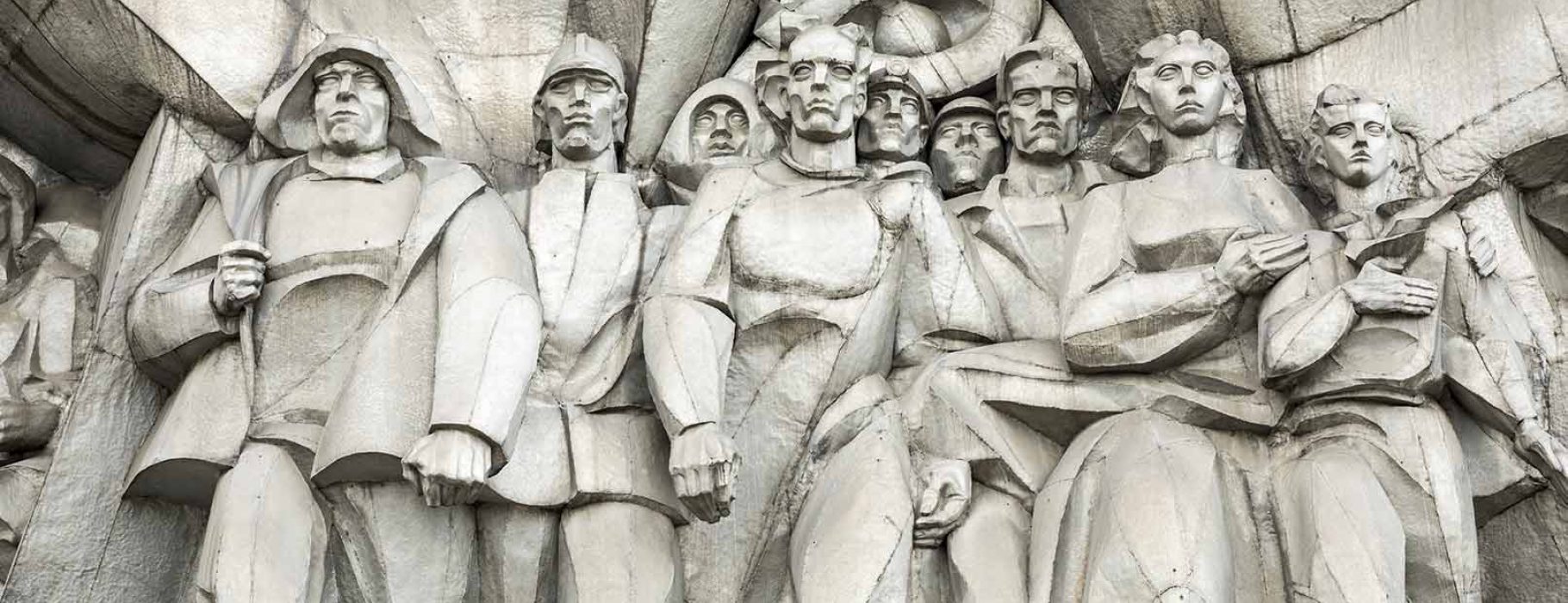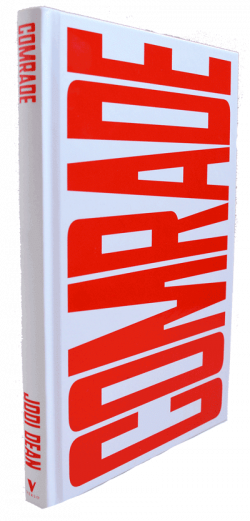Disapproving of our local’s commitment to union democracy, the president of the Canadian Union of Public Employees, a classic conservative bureaucrat by the name of Paul Moist, spoke at Local 3903’s General Membership Meeting just over ten years ago. Or, rather, Mr. Moist harangued us. Repeatedly, he’d use the phrase “brothers and sisters,” in spite of pleas from the gathered members that this was not gender-neutral language, that some of us were neither a brother nor a sister. We demanded that he call us “comrades,” but to no avail: Moist comes from a fraction of the labor movement that never much thought about the concept itself (comrade or genderqueer). In this case, as Engels would say, “the proof of the pudding is in the eating”. “Comrade” is a term to use in labor or Left circles that is neither raced nor gendered. And in that lack of racializing or gender-coding, it reflects a social relation amongst comrades that can affirmatively move beyond the false equivalencies of “brother and sister” or “union siblings”. It neither reduces nor deduces humanity, but instead affirms a shared meaning and a shared struggle.
It is to Jodi Dean’s credit that she has written a succinct, readable, and sometimes profound text on the concept of the Comrade, capital C. In his classic text, Alienation: Marx’s Conception of Man in Capitalist Society, the philosopher Bertell Ollman casts an eye on Marx’s relational theory. Ollman distinguishes the general notion of relations which he does not capitalize, with the capitalized Relations in a Marxian/dialectical sense. In this spirit, for the purpose of conceptual distinction, I will use capital C for Dean’s concept, non-capitalized for the general term. At its best, Dean’s theorization is relational and implicitly rooted in class, to use Ellen Meiksins Wood’s conceptualization, as a relation as opposed to a social location. Yet, at times fudging this distinction, Dean begs the question as to what constitutes the politics underlying the specificity of the question’s formulation. Is this a contribution to general Left strategic and tactical political theory? Or is it something with the specific political prerequisites of being steeped in Comrade Dean’s edifice, not to mention those of Badiou, Zizek, and Lacan? Is it for revolutionaries from a variety of traditions, or does it speak specifically from a particular tradition?
There are indications, on that front, that this is two books at once. The first is a meaningful and beautifully written, and debate-worthy text of the notion of comradeship as a structured process, a relation rather than a signifier. The process of Comrade as a degendering concept is unpacked with concrete examples of debates within the communist movement in both the United States and the Soviet Union. The concept itself “provides the perspective comrades take when they see themselves acting politically.. ..generated by their relation to others on the same side…sexist, racist capitalist society unavoidably intrude, but comrade names a relation no longer determined by these factors.”1Pp. 36-37.
The other book uses the concept of Comrade, as a McGuffin, and in doing so, annihilates the human, sensuous, and relational aspects of comradeship. This is to say, it is a formulation that contains an inherent contradiction. In a sense, this can be read as not merely a conceptualization of the generic comrade. Rather it can be read as pertaining to a comrade that shares Dean’s politics.
Dean is reportedly a supporter of the Party for Socialism and Liberation (PSL), which has what many would refer to as “campist”2Today’s “campists”, range from outright “tankies” who celebrate any and all anti-American powers, deriving from the original meaning of the term as denoting those who side with one “camp” or another during the Cold War, while those who used the term, third campists, used to say “Neither Washington nor Moscow.” It is not that Dean is a campist, indeed the implication of her work actually would indicate a “neither Washington nor Moscow” type of politics, quite literally, in today’s neo-Cold War atmosphere. Yet the PSL “line” is as “campist” as it gets, giving cover to murderous despots like Assad, and seeing China, like Russia, as an anti-imperialist power. Today’s world has ironically resolved the splits in the “campist camp” falling out of the Sino-Soviet split, something humorously shown in the similar politics of the parties flowing out of that split within India. politics and a classic Marxist Leninist party structure. Indeed, her thinking has perhaps guided some recent turns in PSL’s activity towards more comradely relations with the rest of the Left. Thus she focuses more on well-worn criticism of identity politics, but includes unironic quoting of Stalin (on the “National Question”) in an otherwise perfectly reasonable explication of the Black Belt thesis, among other such provocations. One is left with a suspicion that Comrade Dean is using her exceptional prose skills to work at instrumentalizing her investigation of comradeship in the services of a specific set of politics. To a lesser extent she is staking claims within theoretical debates among psychoanalytically inflected Marxists.In particular, we consistently revisit or the arcana of seemingly detached debates amongst the likes of Alain Badiou and Slavoj Zizek. These inflections may provide metaphorical value, but they add nothing to her argument one way or another.
Yet that set of politics stands in contrast to generic aspects of her conceptualization of comradeship itself. The book’s popularity, beyond the small cohort of traditional campists, may be in how it works to re-naturalize as opposed to de-naturalize traditional hierarchical forms of comradeship. This involves arriving at conclusions reassuring to anyone already primed for top-down organizational structure and an oleaginous and uncritical opposition to US foreign policy. This opposition, while styling itself anti-imperialist, often comes at the expense of also opposing other imperialist powers.
The authorial intent of the book seems genuinely non-sectarian. Certainly, Dean approvingly quotes Stalin but also Trotsky, Orwell, and even Irving Howe. Everyone can be a Comrade in Dean’s bouillabaisse. And there is a virtue to this insofar as insights are sought from a variety of traditions that have broadly constituted Marxist politics since the time of Marx himself. Indeed, the central figure that looms larger than others on the inner meaning of the Comrade is the late Trinidadian author and theorist C.L.R. James, not a hero of any classically Stalinist left.
Perhaps Dean would like to situate her work within that independent, anti-authoritarian Left tradition, which is certainly a key point of reference for her book. Yet the book is juxtaposed to tools with which she molds her insights, tools that at times warp her insights to the point where the wrong questions provide the wrong answers. Not for the first time within orthodox traditions, Dean’s political insights are tied down both to campist political loyalties and stakes in interesting, if sometimes besides-the-point debates within psychoanalytically inflected Marxism.
Whether or not the first book (multifaceted, non-sectarian class-based comradeship) wins out against the second (wooden, authoritarian, and line-driven campism) the text is worthy, in its own spirit, of being pushed beyond its boundaries, or perhaps towards its subterranean homesick dialectic. Dean’s work, like all theory, needs to be seen in context, within the living breathing social history of political thought, What interests underly Dean’s effort, what ideological lacunae are at work, and more importantly what use Comrades can make of such a unique text is an open question. Maybe neither book wins, both exist in an undialectical dyad, a sort of fact/value distinction, the positivism that Thompson saw in Althusser. Indeed, and to Dean’s credit, separately and on their own terms, both books succeed wildly. Yet the second one must be called to task.
A paradigmatic example can be found in Dean’s account of Mary Inman, a pathbreaking socialist feminist recently resuscitated by Viewpoint. Dean takes issue with what she sees as a narrative that implies that Inman was exiled from the party. Yet in her critique, she unwittingly falls into precisely the type of distinction that Inman herself had warned about. That is to say, Inman and the party had wildly different views, not merely on housework as productive labor, but about the very relationship between capitalism and misogyny. While Dean is not unsympathetic to Inman, she fails to see the practical stakes of a debate between a view that connected “women’s oppression” directly with capitalist social property relations in a unitary sense, and another, the party’s, that treated these as “dual systems” or in more current parlance , “axes of oppression.” Dean gives a theoretical bet-hedging between Inman’s early housework-as-productive labour analysis and the party’s “official” line which treated the “oppression of women” as an implicitly separate sphere of oppression, a separate system. How is it that Inman, for Dean, was “treated as a comrade”, when she was objectively “put in her place” by male comrades? Dean sees the treatment as nothing uncomradely. After all, Inman’s primary official party critic Abram Landy still pointed out that the party was for what can be seen as natalist or “family values” approaches to the “woman question.”


